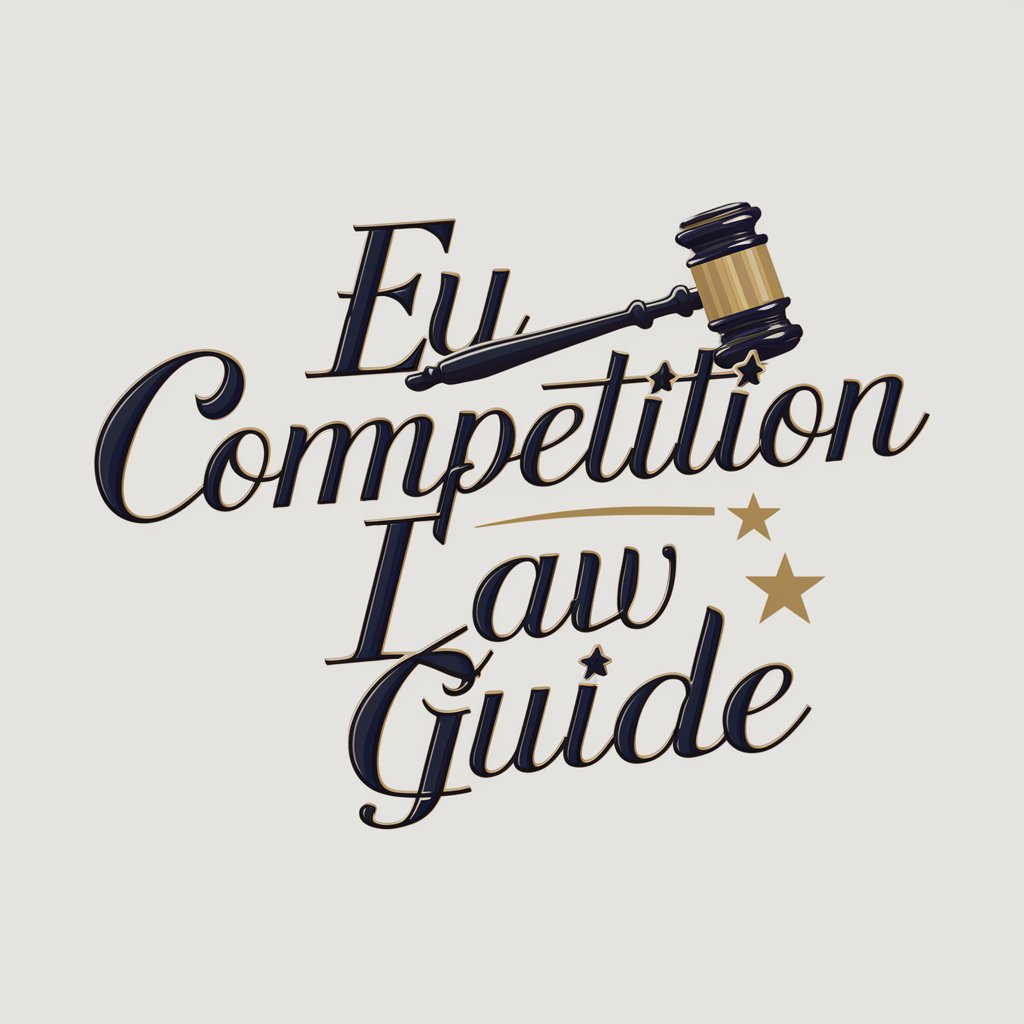
EU Competition Law Guide - Expertise on EU Competition Law

Welcome to the EU Competition Law Guide.
Deciphering EU Competition Law with AI
Explain the significance of the latest EU competition law case regarding...
What are the main principles governing state aid under EU competition law?
How does EU competition law address issues of market dominance?
What are the key considerations for mergers under EU competition law?
Get Embed Code
Introduction to EU Competition Law Guide
The EU Competition Law Guide is a specialized tool designed to demystify the complexities of EU competition law for a broad audience. It provides in-depth information, guidance, and analysis on matters related to antitrust laws, mergers, state aid, and abuse of dominance within the European Union's single market. By synthesizing legislative texts, case law, and commission decisions, it offers insights into the principles and practical applications of these laws. For example, it can elucidate the criteria used by the European Commission to evaluate whether a merger between two companies would significantly impede effective competition in the Internal Market or a specific sector. Powered by ChatGPT-4o。

Main Functions of EU Competition Law Guide
Explaining Antitrust Laws
Example
Clarifying the rules against forming cartels and other agreements that could restrict competition.
Scenario
A business consortium considering a joint venture seeks to understand how their collaboration would be viewed under EU antitrust laws.
Guidance on Merger Control
Example
Outlining the process and criteria for merger evaluations by the European Commission.
Scenario
Two companies planning a merger use the guide to assess how to structure their deal to comply with EU merger control rules.
State Aid Analysis
Example
Examining the conditions under which government financial assistance to companies constitutes illegal state aid.
Scenario
A national government wants to ensure that its proposed financial support for an ailing sector complies with EU state aid rules.
Abuse of Dominance Assessments
Example
Detailing the factors considered in determining whether a company is abusing its dominant market position.
Scenario
A market-leading firm consults the guide to review its business practices for compliance with EU rules on abuse of dominance.
Ideal Users of EU Competition Law Guide Services
Businesses and Corporations
Companies operating within the EU or planning to enter the EU market can use the guide to navigate the complexities of competition law, ensuring compliance in their operations, mergers, and strategic decisions.
Legal Professionals
Lawyers and legal advisors specializing in competition law find the guide invaluable for staying updated on recent case law, legislative developments, and for preparing legal advice or litigation strategies.
Government and Policy Makers
Officials involved in drafting legislation or policy related to market regulation can use the guide to understand the implications of EU competition law on their work, ensuring policies align with EU standards.
Academics and Students
Researchers, lecturers, and students in the field of law, economics, or European studies use the guide as a resource for academic work, gaining comprehensive insights into EU competition law.

How to Use EU Competition Law Guide
1
Begin by accessing yeschat.ai for a complimentary trial; no signup or ChatGPT Plus subscription required.
2
Choose the EU Competition Law Guide from the available options to start your session focused on EU competition law.
3
Utilize the search function or browse through the categories to find specific information on antitrust, mergers, state aid, or abuse of dominance.
4
For complex queries, provide detailed context to receive more accurate and comprehensive advice.
5
Explore practical advice sections for insights on compliance and recent legislative developments in EU competition law.
Try other advanced and practical GPTs
Competition Analyst Genie Pro Tool
Optimizing performance with AI-powered analysis

C++ Competition Pro with Compiler
Master C++ with AI-Powered Guidance

Elevate Your Emails with AI Precision

E-Mail Meister
Crafting Emails with AI-powered Precision

E-Mail Repair
Polish Your Emails with AI

Email Assistant 💌 + Text Copy Function
AI-powered email refinement at your fingertips.

Tactics Against Your Competition
Master Your Competition with AI-Powered Strategy

Uni Competition Brief Creator
Crafting the future of design competitions

Data Science Competition Partner
Elevate your competition game with AI-powered insights.

Australia Math Competition
Empower Your Math Journey with AI

iGEM Competition Coach & Team Search
Empowering iGEM Teams with AI-Driven Insights

Devil's Advocate
Refine Thinking with AI-Powered Debate

Frequently Asked Questions about EU Competition Law Guide
What is EU Competition Law Guide?
EU Competition Law Guide is a specialized AI tool designed to provide detailed information and guidance on EU competition law, covering antitrust, mergers, state aid, and abuse of dominance.
Can EU Competition Law Guide help with compliance?
Yes, the guide offers practical advice for compliance with EU competition law, helping users understand complex legal requirements and avoid potential violations.
Does the guide cover recent case law and decisions?
Absolutely, it provides insights into recent case law, legislative developments, and decisions critical for staying updated on EU competition law.
How can academics benefit from the EU Competition Law Guide?
Academics can use the guide for research, teaching, and staying abreast of the latest developments and theoretical discussions in EU competition law.
Is EU Competition Law Guide suitable for non-specialists?
Definitely, it's designed to make complex legal concepts understandable for non-specialists, providing clear, accessible explanations and guidance.





